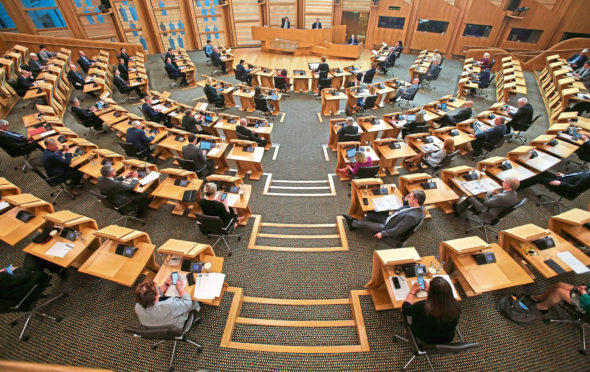It’s a grim old time in Scottish politics. The Covid-19 pandemic has all but destroyed business as usual. Many government plans have been shelved as Nicola Sturgeon has helmed a war effort to get us through the crisis, repositioning her generals and redeploying her artillery.
There have been depressing failures in managing the consequences of Covid-19 for, say, care homes and school pupils. Rhetoric about depoliticising the crisis has predictably fallen foul of a looming election, rows between Westminster and the devolved administrations, and even silly squabbles over whether the BBC has given the first minister too much airtime.
Then there are the economic repercussions of our prolonged lockdown – shuttered businesses realising they will never reopen, the painful, imminent explosion in job losses, the massive debts run up through furlough and other emergency spending.
Even non-Covid-19 business is sub-optimal. The Salmond inquiry is foundering on civil service obfuscation and on witnesses apparently adopting the Clinton method: “It depends on what the meaning of the word ‘is’ is.”
Inquiry chair Linda Fabiani, an SNP MSP, appears keen to cut her pals some slack and help them evade the tougher questions. The nation surely deserves better than linguistic games and establishment intransigence as it seeks clarity on this upsettingly dark affair.
Then there’s the opposition. It’s not clear yet whether new Tory leader Douglas Ross has the right stuff. His absence from Holyrood certainly isn’t helping his attempts to hit the ground running. Labour – and how badly Scotland needs an effective and intellectually effervescent Labour Party – is languishing in the death grip of Richard Leonard, who is determined to cling on regardless of his stark unsuitability and the electoral drubbing he is dragging his colleagues towards.
Despite the exceptional demands of the times, Holyrood is too lame and too tame. The rigours of scrutiny and independence of mind seem alien to many of its inhabitants. There’s a surfeit of time-servers, bed blockers, party hacks and dim bulbs, which is the last thing we need in an era of tumultuous change. It should be no comfort that Westminster is similarly bereft.
My heart lifted, therefore, when the young ex-MP Stephen Gethins announced last week that he is seeking the SNP nomination for Perthshire South and Kinross-shire ahead of next May’s election. A voluntary changing of the guard is taking place in our governing party. Roseanna Cunningham, the cabinet secretary for the environment, is standing down from the seat on which Gethins has set his sights. Also quitting are Health Secretary Jeanne Freeman, former health secretary Alex Neil, and External Affairs Minister Mike Russell. An array of long-serving MSPs, including Bruce Crawford, Sandra White, Linda Fabiani, Stewart Stevenson and Gil Paterson are similarly making way.
As well as Gethins – who since losing his Westminster seat in 2019 has been teaching international relations at St Andrews University – we will hopefully see the arrival of Angus Robertson, who is after the Edinburgh Central nomination. Robertson has a big brain and shone as the SNP’s Westminster leader from 2007 to 2017.
The Tories are losing Ruth Davidson and constitutional expert Adam Tomkins, among others, while Labour will say goodbye to Iain Gray, Elaine Smith and Jeremy Corbyn’s Scottish henchman Neil Findlay.
There is opportunity and danger here. The danger is that the drab Scottish political tradition of Buggins’ Turn maintains, and that outgoing MSPs are replaced by the usual constituency veterans and grumpy councillors who will be little more than lobby fodder. The opportunity is for the parties to seek out the brightest and best and in doing so revolutionise the profile of Holyrood.
Many of the tasks facing law makers over the coming decade are new and fiendishly tricky and will be best met by individuals who bring intelligence, fresh perspectives, free thinking and youthful modernity to the chamber.
But it’s not just the individuals who matter. After 21 years, the practices of devolution badly need freshening up.
Committee chairs should be elected by parliament rather than appointed by party leaders. This would instantly ensure these bodies are more independent, and offer an alternative career path to backbenchers. Committees would be set loose to hold ministers to account and challenge policy – given the absence of a revising chamber this is a long overdue step.
MSPs should be allowed to speak for longer in parliament. This may seem a recipe for a snorefest, but is actually an incentive to think harder about policy. Speakers are currently allowed a maximum of six minutes, which is too short. Giving 15 minutes would encourage greater research and more interventions, and improve the quality of debate and therefore democracy.
As suggested by former first minister Lord McConnell, why not consider a second, part-time Citizens Chamber, which would include council representatives as well as people active in other areas of Scottish life, to review the budget and comment on significant legislation?
Holyrood needs a high-voltage jolt of electricity put through it, in personnel, practices and policy. Scotland really can do better.

